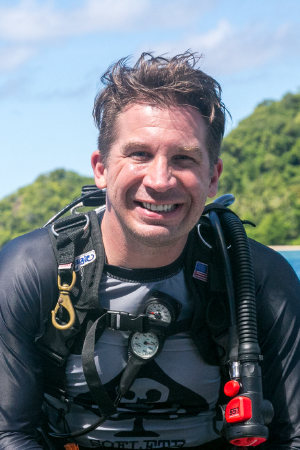With Project Recover, Derek Abbey, '99, repatriates Americans missing in action
From the Winter 2022 issue of the Oregon Stater magazine
By Kevin Miller
As Derek Abbey, '99, was interviewed for this story in early fall, he was home in Bend, cramming SCUBA and other gear into two bags for a trip to the Pacific island of Palau, where he, his workmates and many volunteers intended to recover remains and personal effects of three American sailors from the wreck of a World War II TBF Avenger torpedo bomber.
Eight decades after their plane went down in 100 feet of water, the crew was still officially missing in action. Research had revealed the plane's location, and Abbey, a Marine combat veteran who has been CEO of Project Recover (projectrecover.org) since 2019, hoped the mission would lead to the flyers' remains being repatriated to their families.
"At some point, we'll probably have to cut the aircraft apart," he said. "The whole intention is to get to those people, recover them and eventually bring them home."
The nonprofit Project Recover, Abbey has written, "is a collaborative effort to enlist 21st-century science and technology in a quest to find and repatriate Americans missing in action since World War II, in order to provide recognition and closure for families and the nation."
"We do everything from the initial research to executing the search missions — locating and documenting the sites — and now we're getting into recovery, in partnership with the Department of Defense," he said. Remains and other evidence are carefully packaged and shipped to military labs for analysis, in the hope of making positive identifications.
Abbey graduated from Oregon State as a Marine lieutenant in 1999 with a B.A. and a B.S. in history. He would eventually earn a master's in higher education leadership from San Diego State in 2011 and a doctorate in leadership studies from the University of San Diego in 2019.
Meanwhile, he saw nine years of redeployments to Iraq as a weapon systems officer in an F/A-18D Hornet fighter bomber and as a special operations forward air controller. He was on the cover of the Stater in spring 2008 as part of a story on Beavers serving in Iraq. Away from the military, he worked on college campuses, helping veterans and international students find pathways to success.
Sometimes, he said, the veterans were thrown off by how much freedom college students have.
"The thing I would hear so often was, 'Just tell me what to do,' and I would say, 'No, this is your life now. You get to make the decisions about what you're going to do.'"

A voracious learner who is in the middle of reading a biography of every U.S. president, Abbey is a proud and grateful Beaver.
"My time at Oregon State changed my life's trajectory in so many ways," he said. "Studying history, you learn a lot about human nature over time."
In history and current times, Abbey has always paid close attention to who succeeds as a leader, who doesn't, and why.
"People work really, really hard to attain roles where they have responsibility," he said, "and then they get scared of letting their power go, of pushing it out to those in their organization, not realizing that the more trust you push out, the more it comes back to you. The more people enjoy what they're doing, the more you accomplish.
"At some point I started developing a personal mission statement, which sounds very military but it's not. Mine's really simple: I want to have a positive impact on as many people as I can throughout my lifetime."
At Project Recover, Abbey leads people who, like he does, fervently believe the nation owes loved ones and descendants of fallen service members a maximum effort to determine what happened and bring home their remains. Sometimes the efforts fail, but often they culminate in repatriation ceremonies, gatherings held across the nation in which missing war casualties are finally laid to rest.
"When an MIA is lost, it creates a void that passes from generation to generation," Abbey said. "The grieving process is interrupted. When you see what happens when we bring them home, well, you can't put it into words.
"Once you get to the point of participating in one of those, there's no turning back."
Learn how to support veteran and other military-connected students at OSU by visiting bit.ly/Veterans_OSU.

